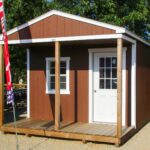Building a small cabin is an exciting venture, whether it’s for a vacation retreat, a guest house, or even a permanent tiny home. However, before you start construction, it’s crucial to understand whether you need a permit for your small cabin kit. Zoning laws, building codes, and local regulations all play a role in determining whether a permit is required.
Understanding Building Permits
A building permit is an official approval from your local government that ensures your construction project complies with zoning laws, safety regulations, and building codes. These permits help maintain structural integrity and environmental protection while ensuring the safety of occupants.
When Do You Need a Permit?
In many cases, a permit is required if your cabin exceeds a certain size, includes plumbing or electricity, or is intended for permanent residency. Here are some key factors that determine whether you need a permit:
1. Cabin Size and Structure
Most counties and municipalities have size thresholds that dictate when a permit is required. If your small cabin kit is under 100 to 200 square feet, you may be able to avoid a permit. However, structures above these limits typically require approval.
2. Zoning and Land Use Regulations
Local zoning laws dictate how land can be used, including what types of structures are allowed. Some areas restrict the construction of small cabins unless they meet specific criteria, such as being a secondary dwelling on a residential lot.
3. Plumbing, Electrical, and HVAC Systems
Even if your cabin is small, installing electrical wiring, plumbing, or heating systems may require a permit. Many localities require inspections to ensure these installations meet safety codes.
4. Foundation Requirements
A small cabin kit placed on a permanent foundation is more likely to require a permit than one built on skids or a temporary base. Foundations impact zoning and property tax assessments.
5. Environmental and Setback Regulations
If your cabin is near water bodies, forests, or other protected areas, special permits may be necessary to comply with environmental conservation laws. Additionally, many areas enforce setback regulations that dictate how far a structure must be from property lines or roads.
How to Check Permit Requirements
To determine whether you need a permit, follow these steps:
- Contact Your Local Building Department – Your city or county planning office can provide details on permit requirements and zoning laws.
- Review State and County Regulations – Some states have lenient building codes for small structures, while others are more restrictive.
- Consult a Professional – If you’re unsure about the regulations, a local contractor or architect can help navigate the permit process.
- Submit Necessary Paperwork – If a permit is required, you may need to submit blueprints, site plans, and other documents for approval.
Choosing a Compliant Cabin Kit
If you’re looking for options that may not require a permit, consider small cabin kits for under $25,000 that are designed to comply with local building codes. These kits often feature compact designs, pre-approved structural components, and easy assembly, making them a great choice for DIY builders.
Final Thoughts
Before building a small cabin, always check with your local authorities to ensure compliance with regulations. Even if a permit isn’t required, following safety and zoning guidelines will help avoid potential legal issues down the road. Proper planning ensures that your cabin project is both enjoyable and hassle-free.

